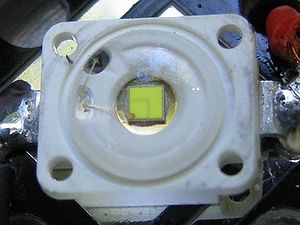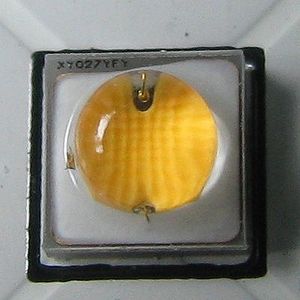Osram: Difference between revisions
(in table, add subgrids that fall on ANSI quads) |
(replace LED's with LEDs) |
||
| (7 intermediate revisions by the same user not shown) | |||
| Line 1: | Line 1: | ||
[[File:osram-led.jpg|thumb|Osram Golden Dragon Plus LED from a Uniquefire AA-S1 flashlight]]Osram is a German company owned by Siemens. Their subsidiary that produces | [[File:osram-led.jpg|thumb|Osram Golden Dragon Plus LED from a Uniquefire AA-S1 flashlight]]Osram is a German company owned by Siemens. Their subsidiary that produces LEDs is called Osram Opto Semiconductors GmbH. | ||
==Golden Dragon Plus== | |||
Osram is known for the Golden Dragon series of LEDs and the OSTAR multiple-die LEDs. The Golden Dragon Plus LED (comparable to a [[Cree]] XP-E) was used in several [[NiteCore]] flashlight models and is still used in some budget models (e.g. the Black Cat HM-01, Tank007 E07, and Uniquefire AA-S1). The Golden Dragon Plus is denoted by the product code W5AM while the regular Golden Dragon is W5SM. The difference between the two seems to be the Plus has a clear silicone lens over the LED while the Golden Dragon has flatter clear resin. However for some reason, the GDP seems to have a wider hotspot which is opposite of what a lens should do. There are tint families for warm white (product code LCW, also includes neutral white tints), white (LW), and ultra white (LUW, others call it cool white). | |||
{|class="wikitable" style="text-align: center; width: 400px;" | {|class="wikitable" style="text-align: center; width: 400px;" | ||
| Line 19: | Line 23: | ||
|} | |} | ||
There are | |||
==Oslon Square== | |||
[[File:osram-oslon.jpg|thumb|Osram Oslon Square LED]]The Oslon Square was announced in November 2011. Capable of being driven at currents up to 1.5 amps, it is a rough equivalent of the [[Cree]] XP-G, although the LED itself is a little smaller at 3mm by 3mm. The viewing angle is 120°. The LED is binned at 700mA. The LED is binned by tints using the ANSI scheme below with the cooler tints using a different scheme. There are several varieties of this chip. The Oslon Square LCW CQAR.EC Eco Champ is intended for indoor use with a warm white tint and a minimum CRI of 80. The LCW CQAR.PC Power Champ has neutral tint of 4000-5000K with a minimum CRI of 70, the LUW CQAR Streetwhite is a cooler 5300-6500K tint with a minimum CRI of 65. Datasheets: [http://catalog.osram-os.com/catalogue/catalogue.do;jsessionid=757049A959CE21A3D44F0B0DA5CF960E?act=downloadFile&favOid=02000005000196ab000100b6 EC], [http://catalog.osram-os.com/catalogue/catalogue.do;jsessionid=757049A959CE21A3D44F0B0DA5CF960E?act=downloadFile&favOid=020000050002a2e2000100b6 PC], [http://catalog.osram-os.com/catalogue/catalogue.do;jsessionid=757049A959CE21A3D44F0B0DA5CF960E?act=downloadFile&favOid=020000050002a337000100b6 EQW], [http://catalog.osram-os.com/catalogue/catalogue.do;jsessionid=757049A959CE21A3D44F0B0DA5CF960E?act=downloadFile&favOid=020000050002a38c000100b6 LUW]. | |||
{|class="wikitable" style="text-align: center; width: 400px;" | |||
|+ Osram Oslon Square Brightness Bins | |||
|- | |||
!Bin !! 350mA<BR>56.5% !! 700mA<BR>100% !! 1000mA<BR>132% !! 1500mA<BR>172% | |||
|- | |||
|LT || 85-93 || 150-164 || 198-216 || 258-279 | |||
|- | |||
|LU || 93-102 || 164-180 || 216-238 || 279-310 | |||
|- | |||
|MP || 102-110 || 180-194 || 238-256 || 310-334 | |||
|- | |||
|MQ || 110-119 || 194-210 || 256-277 || 334-361 | |||
|- | |||
|MR || 119-127 || 210-224 || 277-296 || 361-385 | |||
|- | |||
|MS || 127-136 || 224-240 || 296-317 || 385-413 | |||
|- | |||
|MT || 136-146 || 240-259 || 317-342 || 413-445 | |||
|- | |||
|MU || 146-158 || 259-280 || 342-370 || 445-482 | |||
|- | |||
|NP || 158-172 || 280-304 || 370-401 || 482-523 | |||
|- | |||
|NQ || 172-186 || 304-330 || 401-436 || 523-568 | |||
|} | |||
==Tint Bins== | |||
The warm white and ultra white families ares sometimes binned using a system based on [[ANSI White]] with a number of subgrids overlaid on each ANSI White quadrangle and sometimes falling above or below the ANSI quadrangle. The grid has numbers which are vertical subdivisions (6500K is divided into layers 4, 5, 6, 7, and 8 with 4 falling below and 8 falling above ANSI 6500K) and letters which are horizontal (they follow the color temperatures; for instance, 6500K is divided into vertical bands C,D, and E while 5700K is divided into F and G, and no bands are cooler than ANSI 6500K). It doesn't seem to be their intention to bin by individual subgrid but by groups of subgrids, so a product might be binned as "5J7K" meaning it will somewhere between those subgrids. Finer binning might be available though. | |||
{|class="wikitable" style="text-align: center; width: 500px;" | {|class="wikitable" style="text-align: center; width: 500px;" | ||
| Line 25: | Line 62: | ||
|- | |- | ||
! Bins !! Subgrids !! Temperature !! ANSI Subgrids !! Family | ! Bins !! Subgrids !! Temperature !! ANSI Subgrids !! Family | ||
|- | |-style="background: #ddf" | ||
|4C-8E || 15 || 6500K || 5C-7E || ultra white | |4C-8E || 15 || 6500K || 5C-7E || ultra white | ||
|- | |-style="background: #ddf" | ||
|5F-8G || 8 || 5700K || 5F-7G || ultra white | |5F-8G || 8 || 5700K || 5F-7G || ultra white | ||
|- | |- style="background: #ffb" | ||
|4J-8K || 10 || 4500K || 5J-7K || | |4J-8K || 10 || 4500K || 5J-7K || neutral white | ||
|- | |- style="background: #ffb" | ||
|4L-8N || 15 || 4000K || 5L-7N || | |4L-8N || 15 || 4000K || 5L-7N || neutral white | ||
|- | |- style="background: #fec" | ||
|4O-9Q || 18 || 3500K || 5O-8Q || warm white | |4O-9Q || 18 || 3500K || 5O-8Q || warm white | ||
|- | |- style="background: #fec" | ||
|4R-9T || 18 || 3000K || 5R-8T || warm white | |4R-9T || 18 || 3000K || 5R-8T || warm white | ||
|- | |- style="background: #fec" | ||
|4U-9X || 24 || 2700K || 5U-8X || warm white | |4U-9X || 24 || 2700K || 5U-8X || warm white | ||
|} | |} | ||
To make it a little more confusing, Osram has a different set of chromaticity groups that are not based on ANSI white but whose codes look very similar. These also appear in their datasheets. The regular white products only use this nonstandard approach. | To make it a little more confusing, Osram has a different set of chromaticity groups that are not based on ANSI white but whose codes look very similar. These also appear in their datasheets for the Golden Dragon line. The regular white products only use this nonstandard approach. | ||
==External Links== | ==External Links== | ||
These pages have more info about Osram | These pages have more info about Osram LEDs, including data sheets which contain performance information and binning and labeling info. | ||
[http://catalog.osram-os.com/catalogue/catalogue.do?favOid=000000000002529300090023&act=showBookmark Golden Dragon at Osram] | [http://catalog.osram-os.com/catalogue/catalogue.do?favOid=000000000002529300090023&act=showBookmark Golden Dragon at Osram] | ||
[http://catalog.osram-os.com/catalogue/catalogue.do?favOid=000000030000ad4f037c0023&act=showBookmark Golden Dragon Plus at Osram] | [http://catalog.osram-os.com/catalogue/catalogue.do?favOid=000000030000ad4f037c0023&act=showBookmark Golden Dragon Plus at Osram] | ||
Latest revision as of 18:59, 23 January 2014

Osram is a German company owned by Siemens. Their subsidiary that produces LEDs is called Osram Opto Semiconductors GmbH.
Golden Dragon Plus
Osram is known for the Golden Dragon series of LEDs and the OSTAR multiple-die LEDs. The Golden Dragon Plus LED (comparable to a Cree XP-E) was used in several NiteCore flashlight models and is still used in some budget models (e.g. the Black Cat HM-01, Tank007 E07, and Uniquefire AA-S1). The Golden Dragon Plus is denoted by the product code W5AM while the regular Golden Dragon is W5SM. The difference between the two seems to be the Plus has a clear silicone lens over the LED while the Golden Dragon has flatter clear resin. However for some reason, the GDP seems to have a wider hotspot which is opposite of what a lens should do. There are tint families for warm white (product code LCW, also includes neutral white tints), white (LW), and ultra white (LUW, others call it cool white).
| Bin | 350mA 100% |
700mA 170% |
1000mA 220% |
|---|---|---|---|
| JZ | 61-71 | 104-121 | 134-156 |
| KX | 71-82 | 121-139 | 156-180 |
| KY | 82-97 | 139-165 | 180-213 |
| KZ | 97-112 | 165-190 | 213-246 |
| LX | 112-130 | 190-221 | 246-286 |
| LY* | 130-150 | 221-255 | 286-330 |
Oslon Square

The Oslon Square was announced in November 2011. Capable of being driven at currents up to 1.5 amps, it is a rough equivalent of the Cree XP-G, although the LED itself is a little smaller at 3mm by 3mm. The viewing angle is 120°. The LED is binned at 700mA. The LED is binned by tints using the ANSI scheme below with the cooler tints using a different scheme. There are several varieties of this chip. The Oslon Square LCW CQAR.EC Eco Champ is intended for indoor use with a warm white tint and a minimum CRI of 80. The LCW CQAR.PC Power Champ has neutral tint of 4000-5000K with a minimum CRI of 70, the LUW CQAR Streetwhite is a cooler 5300-6500K tint with a minimum CRI of 65. Datasheets: EC, PC, EQW, LUW.
| Bin | 350mA 56.5% |
700mA 100% |
1000mA 132% |
1500mA 172% |
|---|---|---|---|---|
| LT | 85-93 | 150-164 | 198-216 | 258-279 |
| LU | 93-102 | 164-180 | 216-238 | 279-310 |
| MP | 102-110 | 180-194 | 238-256 | 310-334 |
| MQ | 110-119 | 194-210 | 256-277 | 334-361 |
| MR | 119-127 | 210-224 | 277-296 | 361-385 |
| MS | 127-136 | 224-240 | 296-317 | 385-413 |
| MT | 136-146 | 240-259 | 317-342 | 413-445 |
| MU | 146-158 | 259-280 | 342-370 | 445-482 |
| NP | 158-172 | 280-304 | 370-401 | 482-523 |
| NQ | 172-186 | 304-330 | 401-436 | 523-568 |
Tint Bins
The warm white and ultra white families ares sometimes binned using a system based on ANSI White with a number of subgrids overlaid on each ANSI White quadrangle and sometimes falling above or below the ANSI quadrangle. The grid has numbers which are vertical subdivisions (6500K is divided into layers 4, 5, 6, 7, and 8 with 4 falling below and 8 falling above ANSI 6500K) and letters which are horizontal (they follow the color temperatures; for instance, 6500K is divided into vertical bands C,D, and E while 5700K is divided into F and G, and no bands are cooler than ANSI 6500K). It doesn't seem to be their intention to bin by individual subgrid but by groups of subgrids, so a product might be binned as "5J7K" meaning it will somewhere between those subgrids. Finer binning might be available though.
| Bins | Subgrids | Temperature | ANSI Subgrids | Family |
|---|---|---|---|---|
| 4C-8E | 15 | 6500K | 5C-7E | ultra white |
| 5F-8G | 8 | 5700K | 5F-7G | ultra white |
| 4J-8K | 10 | 4500K | 5J-7K | neutral white |
| 4L-8N | 15 | 4000K | 5L-7N | neutral white |
| 4O-9Q | 18 | 3500K | 5O-8Q | warm white |
| 4R-9T | 18 | 3000K | 5R-8T | warm white |
| 4U-9X | 24 | 2700K | 5U-8X | warm white |
To make it a little more confusing, Osram has a different set of chromaticity groups that are not based on ANSI white but whose codes look very similar. These also appear in their datasheets for the Golden Dragon line. The regular white products only use this nonstandard approach.
External Links
These pages have more info about Osram LEDs, including data sheets which contain performance information and binning and labeling info.